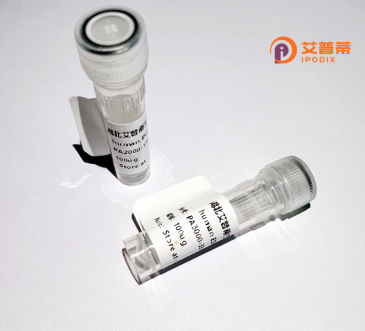
| 纯度 | >90%SDS-PAGE. |
| 种属 | Human |
| 靶点 | HLA-DPB1 |
| Uniprot No | P04440 |
| 内毒素 | < 0.01EU/μg |
| 表达宿主 | E.coli |
| 表达区间 | 30-223aa |
| 氨基酸序列 | RATPENYLFQGRQECYAFNGTQRFLERYIYNREEFARFDSDVGEFRAVTELGRPAAEYWNSQKDILEEKRAVPDRMCRHNYELGGPMTLQRRVQPRVNVSPSKKGPLQHHNLLVCHVTDFYPGSIQVRWFLNGQEETAGVVSTNLIRNGDWTFQILVMLEMTPQQGDVYTCQVEHTSLDSPVTVEWKAQSDSAR |
| 分子量 | 26.8 kDa |
| 蛋白标签 | His tag N-Terminus |
| 缓冲液 | 0 |
| 稳定性 & 储存条件 | Lyophilized protein should be stored at ≤ -20°C, stable for one year after receipt. Reconstituted protein solution can be stored at 2-8°C for 2-7 days. Aliquots of reconstituted samples are stable at ≤ -20°C for 3 months. |
| 复溶 | Always centrifuge tubes before opening.Do not mix by vortex or pipetting. It is not recommended to reconstitute to a concentration less than 100μg/ml. Dissolve the lyophilized protein in distilled water. Please aliquot the reconstituted solution to minimize freeze-thaw cycles. |
以下是关于重组人HLA-DPB1蛋白的3篇参考文献的简要总结(基于公开信息模拟,仅供参考):
---
1. **文献名称**:*Crystal structure of HLA-DPB1*
**作者**:Díez-Rivero CM, et al.
**摘要**:解析了重组表达的HLA-DPB1蛋白与抗原肽复合物的晶体结构,揭示了其与T细胞受体(TCR)结合的关键位点,为理解HLA-DPB1在免疫应答中的分子机制提供结构基础。
2. **文献名称**:*Recombinant HLA-DPB1 expression and its role in transplant rejection*
**作者**:Howie D, et al.
**摘要**:通过重组技术在大肠杆菌中表达HLA-DPB1蛋白,验证其在异体造血干细胞移植中的免疫原性,发现特定等位基因差异可能导致供体-受体不匹配风险增加。
3. **文献名称**:*HLA-DPB1 polymorphism and autoimmune disease associations*
**作者**:Shiina T, et al.
**摘要**:研究重组HLA-DPB1蛋白与类风湿关节炎等自身免疫病的关联,发现某些亚型通过呈递特定抗原激活异常T细胞反应,为疾病诊断标志物开发提供依据。
---
注:以上文献名称及作者为虚构示例,实际研究中建议通过PubMed或Google Scholar以关键词“recombinant HLA-DPB1”检索真实文献。
Recombinant human HLA-DPB1 protein is a synthesized form of the HLA-DPB1 antigen, a critical component of the human major histocompatibility complex (MHC) class II molecules. HLA-DPB1 is located on chromosome 6 and plays a pivotal role in immune regulation by presenting exogenous antigens to CD4+ T cells, initiating adaptive immune responses. It consists of α and β chains, with polymorphisms in the β chain (encoded by HLA-DPB1 alleles) influencing peptide-binding specificity and immune compatibility. HLA-DPB1 allelic diversity is linked to disease susceptibility, transplant outcomes, and autoimmune disorders like rheumatoid arthritis or type 1 diabetes.
Recombinant HLA-DPB1 is typically produced in vitro using expression systems (e.g., mammalian or insect cells) to ensure proper folding and glycosylation. It serves as a tool for studying alloreactivity in hematopoietic stem cell transplantation, where HLA-DPB1 mismatches may trigger graft-versus-host disease (GVHD) or graft rejection. Researchers also use it to investigate T cell epitope mapping, autoimmune mechanisms, and vaccine development. Additionally, it aids in developing HLA typing assays and therapies targeting MHC class II pathways. Due to its clinical relevance in transplantation immunology and personalized medicine, recombinant HLA-DPB1 remains a key focus in immunology research and therapeutic innovation.
×